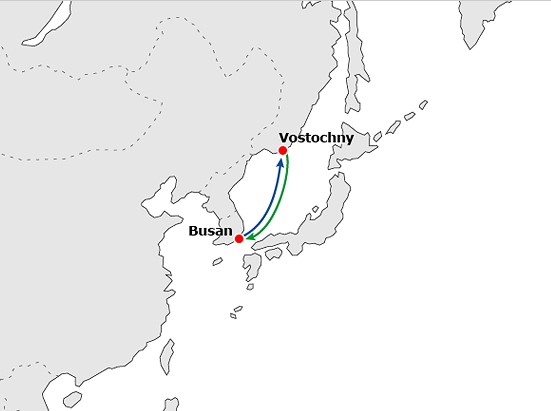New China-Russia Maritime Routes Emerge as Trade Booms
Chinese and Russian companies have been organizing regular chartered ships to ensure that much-needed goods such as raw materials can be delivered from Russia to countries such as China and India amid a transport inadequacy due to the continuous disruption posed by the West’s sanctions on Russia.
The shipping service lines between Russia and other countries have been insufficient after most international shipping conglomerates, including Maersk, suspended container shipping to Russia over the fear of incurring secondary sanctions. China-Europe freight trains, which have been playing a resilient role in sustaining cross-continental trade, are now facing excessive demand with the CEEC routes between China and Russia increasing in volume this year.
Russian freight forwarder Inteco and Swift Transport Group have stepped into the gaps left by companies such as Maersk and jointly created liner operating subsidiaries to offer container shipping services between Vostochny in the Russian Far East and port cities on China’s eastern seaboard, a response to the rising demand for smooth and safe trade.

Industry information platform container-news.com said that the first service covers Vostochny, Lianyungang and Qingdao in East China and South Korea’s Busan, with a two-week turnaround, while other services, using two general cargo vessels that can each carry 264 TEUs, covers Vostochny and East China’s Ningbo, but can also pick up cargo at other China ports if needed. Additional ships and larger charter vessels are being considered to add calls to Shenzhen and Hong Kong.
Russia’s trade with countries such as China and India have picked up significantly given the high complementarity of their economies. Russia needs mechanical equipment and other daily commodities from China, while Russia’s energy exports are needed in China and India.
Tommy Tan, president of Shanghai EPU Supply Chain Management Co, an agent for China-EU freight trains, stated this week that in the context of the surge in China-Russia trade and the suspension of Russian routes by some of major international shipping companies, China-Europe freight trains have become a supply guarantee channel for transportation. However, the China-Europe freight train has reached its ceiling in the face of the booming demand, an indication of why the chartered container ships are needed.
A client of Shanghai EPU stated that “At present, the capacity of the China-Europe trains departing from Jining in Ulanqab [in North China’s Inner Mongolia], and passing through Russia has peaked, so we have to close the channel for receiving goods from other parts of China in prioritizing the delivery needs of local enterprises”
Purefine Wood Trade Agency, a Changzhou-based trading company in East China’s Jiangsu Province, which conducts trade with Russia, also stated that “it’s hard to find a container available these days, while the delivery time via the cargo trains has been extended by an extra week between cities in Western Russia and China, given the high demand.”
The freight rate of the cross-border cargo train between China and Russia has increased by about 10% each month since the Russia-Ukraine conflict started, with raw materials from Russia taking a big part of transportation capacity. Ocean container vessels are needed to get around the rail capacity problem.
Customs offices across China have been ramping up their efforts to smooth trade flows via train. For example, Jining Customs, a clearing station and hub for international freight trains in Inner Mongolia, has opened a “green channel” for timely inspection and clearance of goods upon arrival 24 hours a day, seven days a week. Despite Western sanctions against Russia, China’s Foreign Ministry has repeatedly stated that China opposes the unilateral sanctions and will continue normal economic and trade cooperation with Russia.
Related Reading
About Us
Chris Devonshire-Ellis is the Chairman of Dezan Shira & Associates. The firm assists British and Foreign Investment into Asia and has 28 offices throughout China, India, the ASEAN nations and Russia. For strategic and business intelligence concerning China’s Belt & Road Initiative please email silkroad@dezshira.com or visit us at www.dezshira.com





